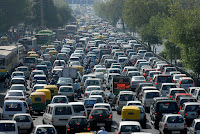 Every city has it's own history. And this history it's closely related with the history of the whole humanity. Since people are not perfect, it's common for them to have problems.
Every city has it's own history. And this history it's closely related with the history of the whole humanity. Since people are not perfect, it's common for them to have problems.Nowadays, people spread throughout the world making societies. And despite the fact that they have different culture and place where they live, common problems take place anyway.
The first one is the problem of overpopulation. Millions of people try to live in one place, reducing the amount of the private space. For example, New-York has the population over than 8 million people. Indeed, it's more than Australia or Sweden have.
The second one is the transport problem, which implies from the first one. The number of people is growing and the number of vehicles is growing too.
Another one is ecological problem. Since industrial revolution happened, a lot of new manufactures have been invented. People are exploiting the nature with the wish to fulfill their growing requirements. As the result, we have many kinds of threat for the Earth's well-being. For instance, in London 52 000 people died due to extreme level of smog in 1952.



